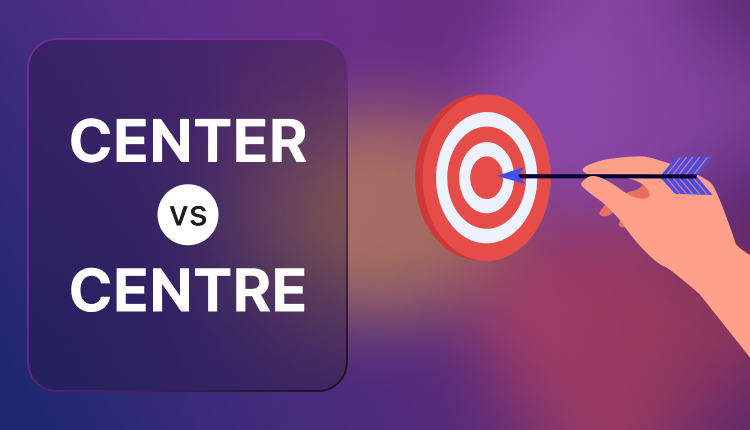English can be tricky, especially when it comes to words that sound the same but have different spellings. Such words are called “homophones”, and one of its examples is “center” and “centre”.
Although they are enunciated the same way and have the same meaning, they both are spelled depending of the English being used. When should you use “center” over “centre”? Are there rules for using them?
Understanding these subtleties can help you use them correctly, especially in academic writing where avoiding errors and being precise is crucial.
Difference Between “Center” and “Centre”
The terms “center” and “centre” both refer to the middle or focal point of something, whether it’s a physical location, an organizational structure, or a concept. The distinction between the two spellings depends on the regional preference.
The spelling “centre” is the older form and reflects the original Norman French spelling and pronunciation. It is used commonly in British English and other Commonwealth countries.
In contrast, the spelling “center” is more commonly used in American English. This version emerged from the efforts of the American lexicographer Noah Webster to simplify and standardize American spellings. Webster favored “center” over “centre” to better match the way the word is pronounced.
When to Use “Center” and “Centre”
Your choice between “center” and “centre” should depend on the intended audience and the specific context. The words “center” and “centre” can be used interchangeably to refer to the middle or central position of something, both literally and figuratively. They are commonly found in the names of buildings and locations.
The accurate guideline is to use “centre” when writing for a British audience or in the context of British English. This applies to academic publications, government documents, and other formal communications originating from the United Kingdom and other Commonwealth nations.
Similarly, the appropriate choice is “center” when writing for an American audience or in the context of American English. This spelling is the standard usage in the United States, as well as in many international publications that adhere to American stylistic conventions.
To understand this better, let’s look at some examples of “center” and “centre”:
Examples of Center
- The research center at the university is at the forefront of renewable energy technology.
- The discussion at the conference will center around the latest advancements in medical imaging.
Examples of Centre
- The new research centre, established by the university, is located in the heart of the city.
- The upcoming seminar will centre the discussion on the implications of AI in the classroom.
Examples of Center in American Media
- Welcome to CMH’s Web catalog of publications. The catalog enables you to access the Center’s complete collection of over 600 publications, from the most recent releases to those that date back decades. Also provided are guidelines for ordering publications.
Reference: US Army Center for Military History
Example of Centre in British Media
- Designed by Graham Dawbarn and operational by 1960, BBC Television Centre was, at the time, one of the most technically advanced production hubs in the world. The complex lies four miles outside central London at Shepherds Bush on a site used for the Franco-British exhibition of 1908.
Reference: BBC
How to Use “Center” and “Centre”
Both “center” and “centre” can be used as nouns and verbs, providing flexibility in language usage and regional variations. Understanding the differences and proper contexts for these terms can enhance clarity and effectiveness in written and spoken communication.
As Noun
Both “center” and “centre” refer to a place or group of buildings where a specified activity is concentrated or sometimes refers to the exact middle of something.
Example:
- The surprise at the center of the garden maze was a beautifully sculpted fountain.
- Sarah volunteers at the Centre for Animal Rescue.
As Verb
When used as a verb, “center” and “centre” mean to place something in the middle of a specified area, to locate a midpoint, or to focus around a central topic.
Example:
- To achieve career goals, it’s important to center your mind in the present moment.
- Measure the wall to centre the painting.
Tip to Remember the Difference Between “Center” and “Center”
Always remember to choose “center” for American audiences and “centre” for British audiences. An essential tip to remember the difference between them is to recall the word ‘enter’ when you come across ‘center’ to associate it with the American English spelling, as they both have same ending of “er”.
Distinguishing “Center” Vs. “Centre” with Trinka AI
It could be difficult to walk through the terrains of language, especially in case of words like center and centre. Trinka AI as a writing companion can assist you in ensuring the correct and consistent use of “center” and “centre” in your academic works.
By analyzing the context and intended audience, it can provide real-time suggestions on the appropriate spelling to use, helping you maintain a polished and professional tone throughout your research papers, journal articles, or other academic publications.
Elevate your writing with the power of Trinka AI grammar checker. Let this intelligent assistant be your grammar guide.

